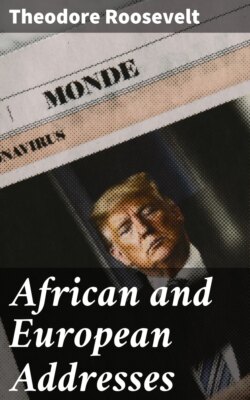African and European Addresses

Реклама. ООО «ЛитРес», ИНН: 7719571260.
Оглавление
Theodore Roosevelt. African and European Addresses
African and European Addresses
Table of Contents
FOREWORD
Introduction
Mr. Roosevelt as an Orator
Peace and Justice in the Sudan
An Address at the American Mission[2] in Khartum, March 16, 1910
Law and Order in Egypt
An Address before the National University in Cairo, March 28, 1910
Citizenship in a Republic
An Address Delivered at the Sorbonne, Paris, April 23, 1910
International Peace
An Address before the Nobel Prize Committee Delivered at Christiania, Norway, May 5, 1910
The Colonial Policy of the United States
An Address Delivered at Christiania, Norway, on the Evening of May 5, 1910
The World Movement
An Address Delivered at the University of Berlin, May 12, 1910
The Conditions of Success
An Address at the Cambridge Union, May 26, 1910
British Rule in Africa
Address Delivered at the Guildhall, London, May 31, 1910[11]
Biological Analogies in History[15]
Delivered at Oxford, June 7, 1910
Appendix
CONVOCATION
JUNE 7, 1910
FOLLOWED BY THE DELIVERY OF. THE ROMANES LECTURE
BY. THE HON'BLE THEODORE ROOSEVELT
HON. D.C.L
THE RIGHT HONOURABLE. LORD CURZON OF KEDLESTON
CHANCELLOR. PRESIDING. Convocation and the Romanes Lecture,
June 7, 1910[16]
Convocation and the Romanes Lecture
TRANSLATION OF THE LATIN
FOOTNOTES
Отрывок из книги
Theodore Roosevelt
Published by Good Press, 2019
.....
Convocation and the Romanes Lecture
Between the delivery of the Cairo speech and that of the next fixed address, the lecture at the Sorbonne in Paris on April 23d, there were a number of extemporaneous and occasional addresses of which no permanent record has been, or can be made. Some of these were responses to speeches of welcome made by municipal officials on railway platforms, or were replies to toasts at luncheons and dinners. In Rome, Mayor Nathan gave a dinner in his honor in the Campidoglio, or City Hall, which was attended by a group of about fifty men prominent in Italian official or private life. On this occasion the Mayor read an address of welcome in French, to which Mr. Roosevelt made a reply touching upon the history of Italy and some of the social problems with which the Italian people have to deal in common with the other civilized nations of the earth. He began his reply in French, but soon broke off, and continued in English, asking the Mayor to translate it, sentence by sentence, into Italian for the assembled guests, most of whom did not speak English. Both the speech itself and the personality of the speaker made a marked impression upon his hearers; and after his retirement from the hall in which the dinner was held, what he said furnished almost the sole subject of animated conversation, until the party separated. In Budapest, under the dome of the beautiful House of Parliament, Count Apponyi, one of the great political leaders of modern Hungary, on behalf of the Hungarian delegates to the Inter-Parliamentary Union presented to Mr. Roosevelt an illuminated address in which was recorded the latter's achievements in behalf of human rights, human liberty, and international justice. Mr. Roosevelt in his reply showed an intimate familiarity with the Hungarian history such as, Count Apponyi afterwards said, he had never met in any other public man outside of Hungary. Although entirely extemporaneous, this reply may be taken as a fair exemplification of the spirit of all his speeches during his foreign journey. Briefly, in referring to some allusions in Count Apponyi's speech to the great leaders of liberty in the United States and in Hungary, he asserted that the principles for which he had endeavored to struggle during his political career were principles older than those of George Washington or Abraham Lincoln; older, indeed, than the principles of Kossuth, the great Hungarian leader; they were the principles enunciated in the Decalogue and the Golden Rule. One of the significant things about these sermons by Mr. Roosevelt—I call them sermons because he frequently himself uses the phrase, "I preach"—is that nobody spoke, or apparently thought the word cant in connection with them. They were accepted as the genuine and spontaneous expression of a man who believes that the highest moral principles are quite compatible with all the best social joys of life, and with dealing knockout blows when it is necessary to fight in order to redress wrongs or to maintain justice.
.....